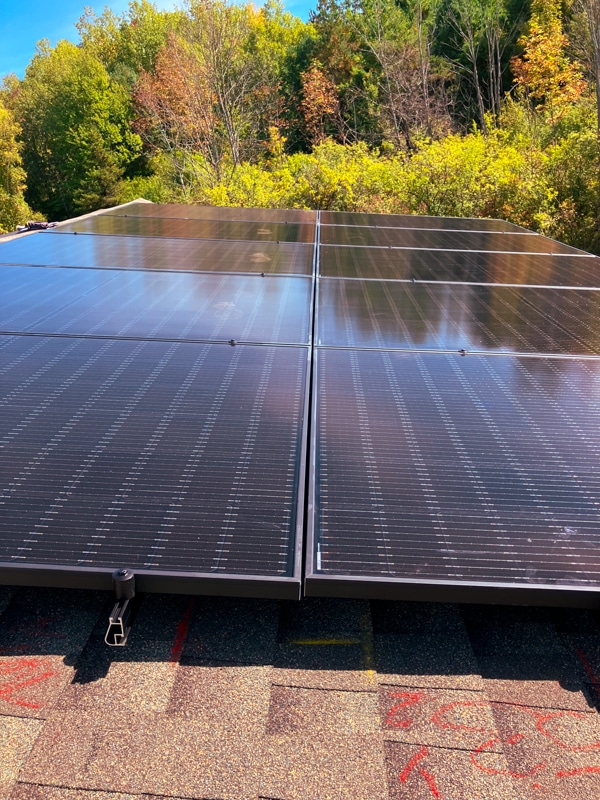As poor air quality events become more frequent due to wildfire activity and environmental changes, transitioning to renewable energy sources like solar power is increasingly important. Recently, our neighbors in New Jersey implemented fire restrictions to limit outdoor activities and reduce additional pollution during days of compromised air quality.
These restrictions and the associated decline in air quality extend beyond New Jersey, impacting residents in nearby areas like us in Upstate New York. Adopting solar energy during these events offers benefits beyond financial savings. It supports healthier communities and reduces dependency on energy sources contributing to air pollution.

Key Benefits of Going Solar During Poor Air Quality:
1. Reduced Reliance on Polluting Fuels
Traditional energy sources, like coal and natural gas, generate pollutants that contribute to smog and worsen air quality. However, solar energy creates power without emitting harmful pollutants. By transitioning to solar, you can lessen the demand for fossil fuels, reducing air pollution during critical periods when the air quality is already poor.
2. You Use Clean, Local Energy
Many outdoor activities are discouraged during poor air quality events, but our homes are not immune to pollution. Using solar energy to power your home helps reduce emissions from large power plants, which tend to ramp up during high-demand periods and can increase air quality issues. By installing solar panels, you can make an impact by reducing the need for those plants to operate at total capacity.
3. Protection from Rising Energy Costs
High demand for energy during hot and poor air quality days often leads to increased electricity costs, as utilities rely more on fossil fuel-based energy to meet demand. Solar systems allow homeowners to generate power, insulating them from price hikes and reducing their overall carbon footprint. New Jersey’s fire restrictions highlight the importance of being prepared to rely less on public energy grids, which can face strain during extreme conditions.
4. Solar Supports Your Health
Poor air quality has immediate and long-term health impacts, including respiratory and cardiovascular issues. By transitioning to solar, you contribute to reducing pollutants, which can improve air quality over time. Solar energy doesn’t emit toxic gases or pollutants, making it a clean choice for people who suffer from asthma and other respiratory conditions.
5. Improves Air Quality for Neighboring Areas
With air pollution from nearby areas like New Jersey affecting us in Upstate New York, residents across state lines can benefit from going solar to reduce their carbon footprint. Wildfire smoke and pollution often travel far distances, and with poor air quality days becoming more common in areas once considered “clean,” Upstate New Yorkers can play a role in reducing the wider region’s reliance on traditional energy sources.
Don't Forget the Financial Incentives to Going Solar!

Earlier this month, smoke from the brush fires in the Palisades area of New Jersey and the downstate Catskills fires reached the Capital Region and Hudson Valley, causing hazy skies and raising concerns about air quality. These incidents underscore the interconnectedness of air quality issues across regions and the importance of reducing pollution sources.
Solar panel systems offer considerable savings over time, and many states provide incentives that reduce the initial cost of installation. New York offers robust tax incentives and rebate programs to encourage solar adoption. By going solar during energy price hikes, homeowners can shield themselves from rising energy bills while receiving tax credits and local rebates, making solar an even more affordable solution.
Adopting solar energy reduces our reliance on fossil fuels, improves regional air quality over time, and decreases pollution-related health risks. For areas impacted by fire restrictions or experiencing poor air quality days, going solar is a step toward creating more resilient and self-sustaining communities. Solar adopters generate clean energy that directly contributes to a healthier local and global environment.
As poor air quality events become more common, going solar offers a solution that benefits the environment and your health. Fire restrictions highlight the importance of air quality, making solar adoption a good financial choice and a way to impact your community and environment positively.
Get in touch if you are ready to go solar or add battery storage to your existing system!
Published: November 11, 2024
Allie Clayboss
Latest Blog Posts

Trump Solar Tariffs & Soaring Utility Rates: Why Go Solar in New York Now?
With major policy changes on the

Why Going Solar During Poor Air Quality Events Is a Smart Choice
As poor air quality events become

Celebrating 6 Years at Kasselman: Mark Bomba
This month, we are highlighting one
